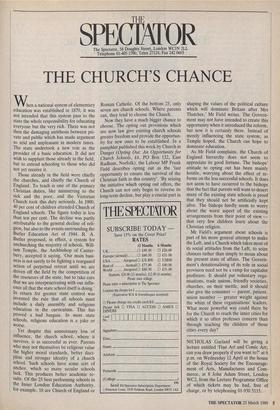SPECT THE ATOR
The Spectator, 56 Doughty Street, London WC1N 2LL Telephone 01405 1706; Telex 27124; Fax 242 0603
THE CHURCH'S CHANCE
hen a national system of elementary education was established in 1870, it was not intended that this system pass to the state the whole responsibility for educating everyone but the very rich. There was not then the damaging antithesis between pri- vate and public which has made argument so arid and unpleasant in modern times. The state undertook a new role as the provider of a basic education. It did not wish to supplant those already in the field, but to extend schooling to those who did not yet receive it.
Those already in the field were chiefly the churches, and chiefly the Church of England. To teach is one of the primary Christian duties, like ministering to the sick and the poor, and the Victorian Church took this duty seriously. In 1900, 40 per cent of children attended Church of England schools. The figure today is less than ten per cent. The decline was partly attributable to the general decline of reli- gion, but also to the events surrounding the Butler Education Act of 1944. R. A. Butler proposed, in effect, a system for unchurching the majority of schools. Will- iam Temple, the Archbishop of Canter- bury, accepted it saying, 'Our main busi- ness is not surely to be fighting a rearguard action of perpetual retreat until we are driven off the field by the competition of the resources of the state, but to take care that we are interpenetrating with our influ- ence all that the state school itself is doing.' In return for greater state control was invented the rule that all schools must include a daily assembly and religious education in the curriculum. This has Proved a bad bargain. In most state schools, religious education is a joke or worse.
Yet despite this unnecessary loss of influence, the church school, where it survives, is as successful as ever. Parents Who may not themselves be religious value the higher moral standards, better disci- pline and stronger identity of a church school. Such schools have some sort of anchor, which so many secular schools lack. This produces better academic re- sults. Of the 25 best performing schools in the Inner London Education Authority, for example, 18 are Church of England or Roman Catholic. Of the bottom 25, only seven are church schools. Where parents can, they tend to choose the Church.
Now they have a much bigger chance to choose. The opting out provisions which are now law give existing church schools greater freedom and provide the opportun- ity for new ones to be established. In a pamphlet published this week by Church in Danger (Opting Out: An Opportunity for Church Schools, fit, PO Box 132, East Rudham, Norfolk), the Labour MP Frank Field describes opting out as the 'last opportunity to ensure the survival of the Christian faith in this country'. 'By seizing the initiative which opting out offers, the Church can not only begin to reverse its long-term decline, but play a crucial part in shaping the values of the political culture which will dominate Britain after Mrs Thatcher,' Mr Field writes. The Govern- ment may not have intended to create this opportunity when it introduced the reform, but now it is certainly there. Instead of merely influencing the state system, as Temple hoped, the Church can hope to dominate education.
As Mr Field complains, the Church of England hierarchy does not seem to appreciate its good fortune. The bishops' attitude to opting out has been mainly hostile, worrying about the effect of re- forms on the less successful schools. It does not seem to have occurred to the bishops that the fact that parents will want to desert many of the existing state schools is proof that they should not be artificially kept alive. The bishops hardly seem to worry about the worst aspect of the existing arrangements from their point of view — that very few children learn about the Christian religion.
Mr Field's argument about schools is part of his more general attempt to make the Left, and a Church which takes most of its social attitudes from the Left, to seize chances rather than simply to moan about the present state of affairs. The Govern- ment's denationalising of its role in social provision need not be a ramp for capitalist profiteers. It should put voluntary orga- nisations, trade unions, friendly societies, churches, on their mettle, and it should also give the consumer — parent, patient, union member — greater weight against the whim of these organisations' leaders. What more powerful way could there be for the Church to reach the inner cities for which it so often professes concern than through teaching the children of those cities every day?


















































 Previous page
Previous page